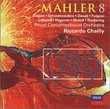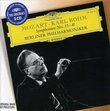| All Artists: Ludwig van Beethoven, Agnes Baltsa, Herbert von Karajan Title: Beethoven: 9 Symphonien Members Wishing: 1 Total Copies: 0 Label: Deutsche Grammophon Release Date: 10/12/1993 Album Type: Box set Genre: Classical Styles: Forms & Genres, Theatrical, Incidental & Program Music, Historical Periods, Classical (c.1770-1830), Modern, 20th, & 21st Century, Symphonies Number of Discs: 6 SwapaCD Credits: 6 UPC: 028943920025 |
Search - Ludwig van Beethoven, Agnes Baltsa, Herbert von Karajan :: Beethoven: 9 Symphonien
 | Ludwig van Beethoven, Agnes Baltsa, Herbert von Karajan Beethoven: 9 Symphonien Genre: Classical
|
Larger Image |
CD DetailsSimilarly Requested CDs
|
CD ReviewsClassically Underated Warren R. Davis | Haddonfield, NJ USA | 09/08/2004 (5 out of 5 stars) "Reviewers often certify that the 1963/4 Karajan/Berliners cycle is far and away the best. I suspect this general opinion is based mostly on their awe for that version of the 9th symphony, and such an opinion is reasonable. The debate rages on, however. I personally think that each of Karajan's recorded cycles was a substantial improvement on the previous version, for two reasons: the steady improvements in recording technology which gave greater transparency to the sound, and the evolution of the interpretation by the most incredible marriage of conductor and ensemble in modern musicmaking history. By the way, there is a fourth cycle by Karajan with the Philharmonia (producer Walter Legge's creation in London, and also led by Klemperer) recorded in the 50s by EMI. It is even swifter than the 60s Berlin version, but not "better." Karajan's forte was with the 7th and 9th symphonies. They "make" each of the sets, and the last versions could not have conceivably been "better." They are not to be dismissed. They are arguably the best performances ever recorded, ranking with the best performances by Furtwaengler, Walter and Klemperer, his only rivals. (Toscanini was the Horowitz of the symphony orchestra; his creations were of something else, not quite what was intended by the composer -- but that's another story.) Klemperer's "live" 9th from 1961 (on BBC Testament) is, I'd say, the truer, more authentic realization: the 3rd movement remarkably (and perhaps exclusively) up-tempo and musical, the 4th showing its debts to earlier masters (even Haendel) as it forges the modern form. While Klemperer is unadorned pure music, Karajan is the master of power. When the music demands it, say in Bruckner and Beethoven especially, he is unequalled in creating the maximum effect. His tempi are less flexible than Klemperer's which clearly embrace the dance elements. Instead Karajan can be described as purposeful in his rhythmic progressions, always feeding a larger theme. In the classical terms, Klemperer is more Dionysian; Karajan, more Apollonian. Both approaches result in glorious renditions, never surpassed, only rarely equalled. Bruno Walter's renditions either in mono with the NYPO (Phila. Orch. in the 6th) or in stereo with the Columbia Symphony are arguably as wonderful and definitive as any others, and more subjectively, even lovingly handled. A few of the performances of the handpicked-for-Walter (largely LA Phil) Columbia Symphony Orchestra have been held in diminished regard by some, unfairly I think. Certainly most, I would say all of the Walter/CSO recordings are among the most beautiful recordings of the Romantic repertoire ever made. Perhaps detractors are responding to the close miking employed by CBS, and perhaps because Walter discouraged showy playing some feel they sometimes lack a certain edge when compared to Walter's recordings earlier in life. (Recorded rehearsals show his later recordings were exactly what he wanted from the CSO, not some unintended shortcoming.) It could also simply be the result of comparing an unretouched recording of a top-rate orchestra to the patched-if-necessary perfect recordings of probably the best orchestra ever, the BPO. It should be noted in this regard that the first Karajan/BPO undertakings in the early sixties were not nearly as polished, the orchestra showing it was not so unlike the Philharmonia, NYPO or CSO. Of the Walter/CSO recordings, the least favorite seems to be the Ninth. A couple of missed trumpet notes to mention, and a very slow, or perhaps heavily indulged third movement. The last movement is taken slower than most until the end, but that is not necessarily wrong. I happen to enjoy it. Klemperer was known for "ponderous" tempi, and I disagree with the aspersion. In those days, flashy, edgy interpretations were somewhat frowned upon, which made the renditions by Toscannini stand out all the more. I compare Toscannini unfavorably for what I consider flashy, often bombastic performances. On the other hand, Karajan can be quite slow, say in Mahler compared with Walter; and Klemperer can be quite swift in concert particularly in the 3rd movement of the Beethoven Ninth. For technical sonic reference, the Karajan/BPO recordings win hands down, and the Walter/CSO recordings are a distant second. The others mentioned suffer from the technical limitations of their times, Furtwaengler's suffering the most, but remain very enjoyable notwithstanding. These performances are precious, and I hope they remain in the Amazon catalogue for a very long time." Karajan and Beethoven Lasse S�ager | Copenhagen, Denmark | 05/16/2000 (3 out of 5 stars) "Karajan recorded the complete cycle of Beethovens 9 symphonies no less than three times: first, in the early sixties, next in the mid seventies and finally in the mid eighties, this recording. Karajan was always at the cutting edge of recording techniques. It was only natural for him to be among the first to embrace the new digital technology, that was the basis of the compact disc - incidentally, his "Zauberflöte" (Mozart) became the first DDD recording to be released on CD by the Deutsche Grammophon Gesellschaft. One of the main reasons for Karajan to do no less than three cycles of Beethoven-symphonies was his desire to leave a state-of-the-art legacy on record (or CD), and as he died in 1989, it became a race against time. It is potentially interesting to be able to view the approach to these hallmark works by the same conductor at three stages of his career. Sadly, it is all too obvious that Karajan had nothing to add to the previous cycles. The only advantage is the polished, deluxe sound that comes from the all-digital DDD recording techniques. The music-making itself has an almost rheumatic quality to it - Karajan's approach to Beethoven was always a rather dry, polished one, far from that of his predecessor as "conductor-in-chief" of the BPO, Wilhelm Furtwängler. At this advanced stage of his career, there was hardly anything left but the polished sound and the precise conducting - no joy or life. This is not to say that Karajan wasn't a great conductor. To my mind, he was perhaps the greatest, also as a conductor of Beethoven. But get the recordings he made during the sixties and early seventies, which, I believe was his best period. Many of those recordings - and there are LOTS of them - are available on disc under the "Originals" label by DGG." My personal favorite cycle. junglered66 | Dublin, OH USA | 03/23/2000 (5 out of 5 stars) "Most critics these days favor Karajan's 1963 integral cycle, but I prefer this, his final of his 4 complete recordings of the symphonies, made in the early to mid-80's. Sound quality is stunning, and the BPO achieves a beauty of sound rarely surpassed, due primarily to K's leadership. This cycle will probably go out of print soon, since DG is heavily promoting the '63 set, so get it now especially if you are a Karajan fan."
|

 Track Listings (8) - Disc #1
Track Listings (8) - Disc #1








